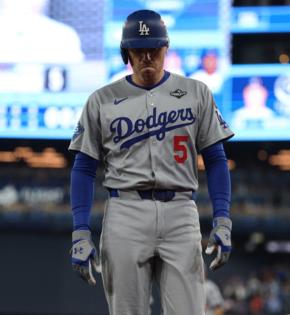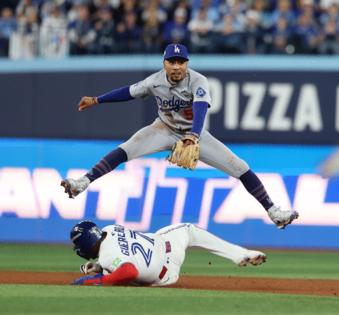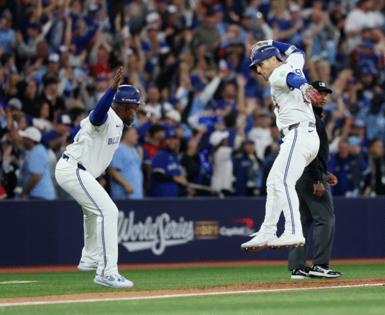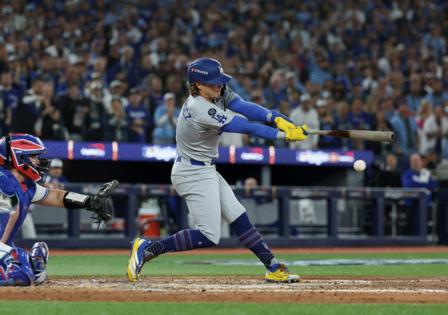Dodgers' biggest weakness resurfaces in World Series Game 1 loss to Blue Jays
Published in Baseball
TORONTO — The Dodgers might be baseball’s version of the Death Star.
But in a raucous World Series opener on Friday night in Toronto, the Blue Jays found their exhaust vent, and triggered an implosion of galactic proportions.
In a nine-run sixth inning that had Rogers Centre rocking and the previously invincible Dodgers reeling, the Blue Jays smashed open what had been a tied score and rolled to an eventual 11-4 win in Game 1 of the World Series.
They attacked the Dodgers’ one glaring weakness in the bullpen. They executed the kind of game script to which the defending champions have long seemed susceptible.
Now, Toronto has a 1-0 lead in this best-of-seven series and has altered the dynamics of this supposed David and Goliath matchup. Game 2 will be back here on Saturday night. And suddenly, it’s the Dodgers facing an urgent search for answers.
Even though the Dodgers took an early lead in Game 1, scoring twice in the first three innings against rookie Blue Jays sensation Trey Yesavage, Toronto was methodically executing the necessary game plan.
They kept Dodgers ace Blake Snell under constant stress, starting with a 29-pitch first inning in which they left the bases loaded but drove up his pitch count. They finally broke through in the fourth, when Snell — lacking his usual fastball command — left a heater down the middle to Daulton Varsho that the Blue Jays outfielder whacked to center for a game-tying two-run homer.
By the start of the sixth, Snell looked gassed.
He walked his first batter. He followed that by allowing a single. Then he plunked Varsho with a full-count fastball, loading the bases without recording an out.
That put Dodgers manager Dave Roberts in a position unlike any he’d encountered previously this postseason. For much of the month, the Dodgers’ dominant rotation had been able to work out of similar late-inning jams. And the times they couldn’t, Roberts would turn to left-hander Alex Vesia to be his primary fireman.
On this night, though, Snell had nothing left — having failed to record a single 1-2-3 inning in what became his shortest start of the playoffs, five-plus innings that required 100 laborious pitches.
Even worse, the Dodgers were playing without Vesia — having left him off the roster while he and his wife deal with what the team described as a “deeply personal family matter,” one that will almost certainly prevent him from pitching this series.
Thus, Roberts had to look elsewhere among a relief corps that had been the weak link of the team all season.
His first decision was going to Emmet Sheehan, the converted starting pitcher who hadn’t appeared at all in the team’s NL Championship Series sweep. But he was ineffective, giving up an RBI single to Ernie Clement, a run-scoring walk to Nathan Lukes in what started as an 0-2 count, then another RBI single to Andrés Giménez.
That put the Dodgers in a 5-2 hole. And, after George Springer grounded into a fielder’s choice, brought Roberts trudging back out to the mound.
The skipper’s next decision, with the Blue Jays inserting left-handed slugger Addison Barger as a pinch hitter, was to turn to his next-best left-hander in Anthony Banda.
Four pitches later, Barger detonated the Dodgers’ reactor core.
Banda threw him an elevated slider on the inner edge of the plate. Barger blasted it to right for the first pinch-hit grand slam in World Series history.
A Dodgers team that had given up five total runs in its last five games, had suddenly yielded seven in one nightmarish inning.
And the torture would only continue from there, with Banda giving up a two-run home run to Alejandro Kirk later in the inning.
By the time the dust had settled, the Blue Jays had sent 12 batters to the plate and watched nine of them come around to score. The steady confidence the Dodgers had been building with their bullpen previously, was shattered in a way that won’t be easy to repair.
It didn’t even matter that Shohei Ohtani — who, out of a string of early missed chances from the Dodgers, squandered perhaps the biggest one by leaving the bases loaded in the second inning — eventually connected on a big swing with a two-run homer in the seventh. Or that their offense had gotten into the Blue Jays’ bullpen early, chasing Yesavage after just four innings.
Instead, their fatal flaw had already been exposed. Their most vulnerable weak spot, disastrously exploited.
©2025 Los Angeles Times. Visit at latimes.com. Distributed by Tribune Content Agency, LLC.
















Comments